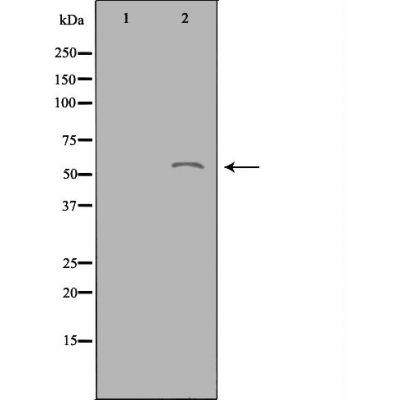ACOT2 Antibody - #DF3734
| Product: | ACOT2 Antibody |
| Catalog: | DF3734 |
| Description: | Rabbit polyclonal antibody to ACOT2 |
| Application: | WB IF/ICC |
| Reactivity: | Human |
| Prediction: | Bovine |
| Mol.Wt.: | 53 KD; 53kD(Calculated). |
| Uniprot: | P49753 |
| RRID: | AB_2836098 |
Related Downloads
Protocols
Product Info
*The optimal dilutions should be determined by the end user. For optimal experimental results, antibody reuse is not recommended.
*Tips:
WB: For western blot detection of denatured protein samples. IHC: For immunohistochemical detection of paraffin sections (IHC-p) or frozen sections (IHC-f) of tissue samples. IF/ICC: For immunofluorescence detection of cell samples. ELISA(peptide): For ELISA detection of antigenic peptide.
Cite Format: Affinity Biosciences Cat# DF3734, RRID:AB_2836098.
Fold/Unfold
AA571646; ACOT2; Acyl CoA thioesterase 2; Acyl coenzyme A thioester hydrolase 2a; Acyl coenzyme A thioesterase 2, mitochondrial; CTE Ia; CTE1A; Long chain acyl CoA thioesterase 2; Mitochondrial acyl CoA thioesterase 1; Mitochondrial acyl CoA thioesterase 2; MTE1; Peroxisomal long chain acyl coA; PTE2; PTE2A; ZAP128;
Immunogens
A synthesized peptide derived from human ACOT2, corresponding to a region within the internal amino acids.
Strongest expression in heart, liver, muscle and kidney. Weak in placenta and pancreas.
- P49753 ACOT2_HUMAN:
- Protein BLAST With
- NCBI/
- ExPASy/
- Uniprot
MSNKLLSPHPHSVVLRSEFKMASSPAVLRASRLYQWSLKSSAQFLGSPQLRQVGQIIRVPARMAATLILEPAGRCCWDEPVRIAVRGLAPEQPVTLRASLRDEKGALFQAHARYRADTLGELDLERAPALGGSFAGLEPMGLLWALEPEKPLVRLVKRDVRTPLAVELEVLDGHDPDPGRLLCQTRHERYFLPPGVRREPVRVGRVRGTLFLPPEPGPFPGIVDMFGTGGGLLEYRASLLAGKGFAVMALAYYNYEDLPKTMETLHLEYFEEAMNYLLSHPEVKGPGVGLLGISKGGELCLSMASFLKGITAAVVINGSVANVGGTLHYKGETLPPVGVNRNRIKVTKDGYADIVDVLNSPLEGPDQKSFIPVERAESTFLFLVGQDDHNWKSEFYANEACKRLQAHGRRKPQIICYPETGHYIEPPYFPLCRASLHALVGSPIIWGGEPRAHAMAQVDAWKQLQTFFHKHLGGHEGTIPSKV
Predictions
Score>80(red) has high confidence and is suggested to be used for WB detection. *The prediction model is mainly based on the alignment of immunogen sequences, the results are for reference only, not as the basis of quality assurance.
High(score>80) Medium(80>score>50) Low(score<50) No confidence
Research Backgrounds
Acyl-CoA thioesterases are a group of enzymes that catalyze the hydrolysis of acyl-CoAs to the free fatty acid and coenzyme A (CoASH), providing the potential to regulate intracellular levels of acyl-CoAs, free fatty acids and CoASH. Acyl-coenzyme A thioesterase 2/ACOT2 displays higher activity toward long chain acyl CoAs (C14-C20). The enzyme is involved in enhancing the hepatic fatty acid oxidation in mitochondria (By similarity).
Mitochondrion.
Strongest expression in heart, liver, muscle and kidney. Weak in placenta and pancreas.
Belongs to the C/M/P thioester hydrolase family.
Research Fields
· Metabolism > Lipid metabolism > Fatty acid elongation.
· Metabolism > Lipid metabolism > Biosynthesis of unsaturated fatty acids.
· Metabolism > Global and overview maps > Metabolic pathways.
· Organismal Systems > Endocrine system > Ovarian steroidogenesis.
Restrictive clause
Affinity Biosciences tests all products strictly. Citations are provided as a resource for additional applications that have not been validated by Affinity Biosciences. Please choose the appropriate format for each application and consult Materials and Methods sections for additional details about the use of any product in these publications.
For Research Use Only.
Not for use in diagnostic or therapeutic procedures. Not for resale. Not for distribution without written consent. Affinity Biosciences will not be held responsible for patent infringement or other violations that may occur with the use of our products. Affinity Biosciences, Affinity Biosciences Logo and all other trademarks are the property of Affinity Biosciences LTD.
